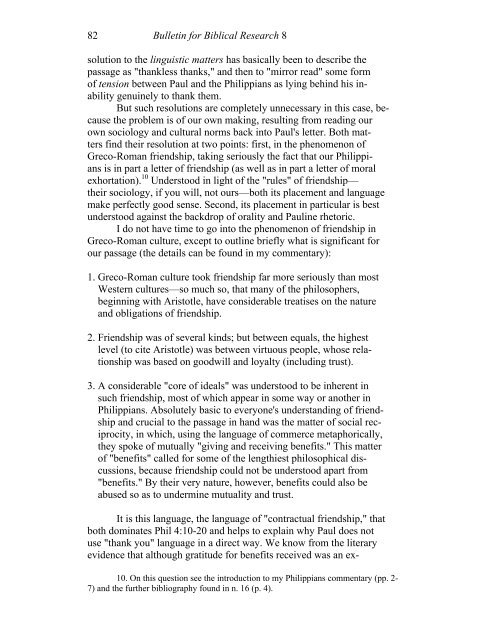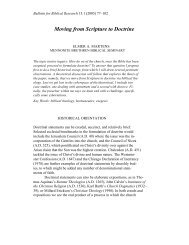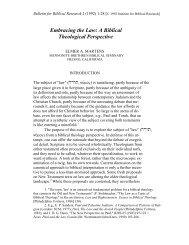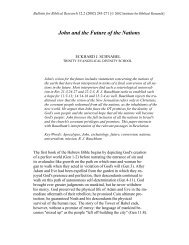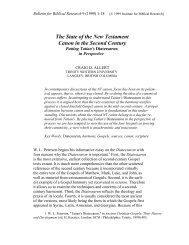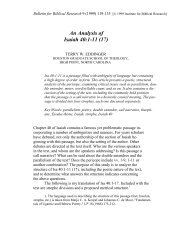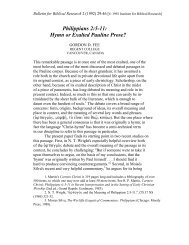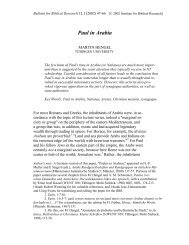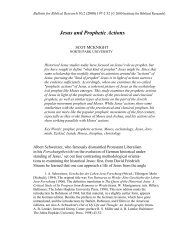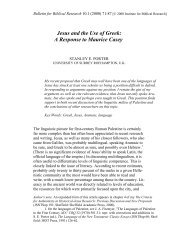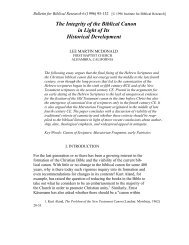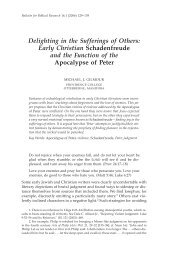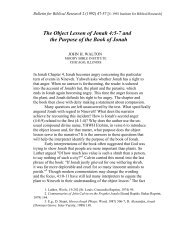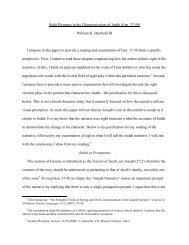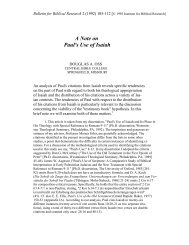Reflections on Exegesis and Spirituality in Philippians 4:10-20
Reflections on Exegesis and Spirituality in Philippians 4:10-20
Reflections on Exegesis and Spirituality in Philippians 4:10-20
Create successful ePaper yourself
Turn your PDF publications into a flip-book with our unique Google optimized e-Paper software.
82 Bullet<strong>in</strong> for Biblical Research 8<br />
soluti<strong>on</strong> to the l<strong>in</strong>guistic matters has basically been to describe the<br />
passage as "thankless thanks," <strong>and</strong> then to "mirror read" some form<br />
of tensi<strong>on</strong> between Paul <strong>and</strong> the <strong>Philippians</strong> as ly<strong>in</strong>g beh<strong>in</strong>d his <strong>in</strong>ability<br />
genu<strong>in</strong>ely to thank them.<br />
But such resoluti<strong>on</strong>s are completely unnecessary <strong>in</strong> this case, because<br />
the problem is of our own mak<strong>in</strong>g, result<strong>in</strong>g from read<strong>in</strong>g our<br />
own sociology <strong>and</strong> cultural norms back <strong>in</strong>to Paul's letter. Both matters<br />
f<strong>in</strong>d their resoluti<strong>on</strong> at two po<strong>in</strong>ts: first, <strong>in</strong> the phenomen<strong>on</strong> of<br />
Greco-Roman friendship, tak<strong>in</strong>g seriously the fact that our <strong>Philippians</strong><br />
is <strong>in</strong> part a letter of friendship (as well as <strong>in</strong> part a letter of moral<br />
exhortati<strong>on</strong>). <strong>10</strong> Understood <strong>in</strong> light of the "rules" of friendship—<br />
their sociology, if you will, not ours—both its placement <strong>and</strong> language<br />
make perfectly good sense. Sec<strong>on</strong>d, its placement <strong>in</strong> particular is best<br />
understood aga<strong>in</strong>st the backdrop of orality <strong>and</strong> Paul<strong>in</strong>e rhetoric.<br />
I do not have time to go <strong>in</strong>to the phenomen<strong>on</strong> of friendship <strong>in</strong><br />
Greco-Roman culture, except to outl<strong>in</strong>e briefly what is significant for<br />
our passage (the details can be found <strong>in</strong> my commentary):<br />
1. Greco-Roman culture took friendship far more seriously than most<br />
Western cultures—so much so, that many of the philosophers,<br />
beg<strong>in</strong>n<strong>in</strong>g with Aristotle, have c<strong>on</strong>siderable treatises <strong>on</strong> the nature<br />
<strong>and</strong> obligati<strong>on</strong>s of friendship.<br />
2. Friendship was of several k<strong>in</strong>ds; but between equals, the highest<br />
level (to cite Aristotle) was between virtuous people, whose relati<strong>on</strong>ship<br />
was based <strong>on</strong> goodwill <strong>and</strong> loyalty (<strong>in</strong>clud<strong>in</strong>g trust).<br />
3. A c<strong>on</strong>siderable "core of ideals" was understood to be <strong>in</strong>herent <strong>in</strong><br />
such friendship, most of which appear <strong>in</strong> some way or another <strong>in</strong><br />
<strong>Philippians</strong>. Absolutely basic to every<strong>on</strong>e's underst<strong>and</strong><strong>in</strong>g of friendship<br />
<strong>and</strong> crucial to the passage <strong>in</strong> h<strong>and</strong> was the matter of social reciprocity,<br />
<strong>in</strong> which, us<strong>in</strong>g the language of commerce metaphorically,<br />
they spoke of mutually "giv<strong>in</strong>g <strong>and</strong> receiv<strong>in</strong>g benefits." This matter<br />
of "benefits" called for some of the lengthiest philosophical discussi<strong>on</strong>s,<br />
because friendship could not be understood apart from<br />
"benefits." By their very nature, however, benefits could also be<br />
abused so as to underm<strong>in</strong>e mutuality <strong>and</strong> trust.<br />
It is this language, the language of "c<strong>on</strong>tractual friendship," that<br />
both dom<strong>in</strong>ates Phil 4:<strong>10</strong>-<strong>20</strong> <strong>and</strong> helps to expla<strong>in</strong> why Paul does not<br />
use "thank you" language <strong>in</strong> a direct way. We know from the literary<br />
evidence that although gratitude for benefits received was an ex-<br />
<strong>10</strong>. On this questi<strong>on</strong> see the <strong>in</strong>troducti<strong>on</strong> to my <strong>Philippians</strong> commentary (pp. 2-<br />
7) <strong>and</strong> the further bibliography found <strong>in</strong> n. 16 (p. 4).


